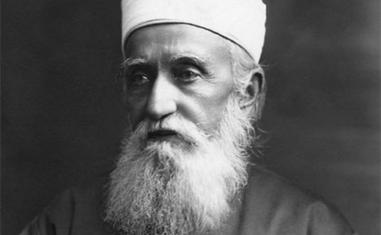In a world that often feels chaotic and disordered, the teachings of ‘Abdu’l-Bahá stand out as a beacon of light, guiding individuals towards a path of compassion, understanding, and unity. But why would one intentionally strive to emulate the life and teachings of ‘Abdu’l-Bahá? This question prompts not only introspection but also invites an examination of the principles he espoused. What challenges might one encounter while attempting to embody these ideals? This exploration seeks to elucidate the profound impact of ‘Abdu’l-Bahá’s life and his teachings, encouraging readers to engage with this challenge of implementation.
‘Abdu’l-Bahá, the son of Bahá’u’lláh, is revered in the Bahá’í faith as the exemplar of its teachings. His life was a tapestry woven with threads of sacrifice, service, and devotion. Living in an era rife with political upheaval and social strife, ‘Abdu’l-Bahá’s example serves as a blueprint for navigating the complexities of human interaction and moral integrity. But to follow ‘Abdu’l-Bahá means to undertake a journey—one filled with introspective challenges and the pursuit of higher virtues.
One pivotal aspect of ‘Abdu’l-Bahá’s teachings is the principle of love and kindness towards others. This fundamental tenet posits that genuine love must permeate all human interactions. In practice, however, how does one maintain a loving disposition amidst the trials of daily life? When confronted with negativity—be it from peers, family, or society—how does one summon the fortitude to respond with grace? This enigma is both a challenge and an opportunity, urging individuals to cultivate resilience and empathy in the face of adversity.
Moreover, ‘Abdu’l-Bahá advocated for the elimination of prejudices of all kinds. This deep-rooted belief calls upon us to reflect on our own internal biases and societal conditioning. The challenge here is twofold: first, to recognize the unconscious prejudices that may reside within oneself, and second, to actively work towards their eradication. The journey towards becoming a true advocate for unity and equality requires vigilance, commitment, and often, discomfort. As individuals confront their own biases, they become more equipped to foster environments of inclusivity, essential for the betterment of humanity.
The essence of service is another cornerstone of ‘Abdu’l-Bahá’s teachings. He exemplified the ideal of selfless service through his actions and sacrifices. His life was a testament to the notion that true fulfillment arises from serving others. Yet, the modern landscape often glorifies individualism and personal achievement. How, then, does one reconcile the desire for personal success with the call to serve? This dichotomy presents a formidable challenge. It begs the question: can one find joy and purpose in serving others while also pursuing one’s dreams? Embracing this duality can lead an individual to a more profound sense of purpose that transcends mere self-interest.
Emphasizing the importance of education, ‘Abdu’l-Bahá stated that knowledge is a most admirable quality. He believed that enlightenment and awareness could propel individuals towards spiritual and moral growth. Yet, in a world overflowing with information, how does one discern truth from misinformation? This contemporary challenge underscores the necessity for individuals to engage in lifelong learning. It encourages a critical examination of the sources and accuracy of information consumed. The pursuit of knowledge must be tempered with wisdom and responsibility, marking a distinguished characteristic of a follower of ‘Abdu’l-Bahá.
Equally significant is the principle of consultation, which ‘Abdu’l-Bahá held in high esteem. Consultation, when practiced authentically, fosters mutual understanding and collective decision-making. However, this principle can often clash with the modern inclination towards individualism. In collaborative settings, how does one balance personal insights with the greater good of the group? This question challenges followers to engage in a harmonious exchange of ideas, placing communal interests above personal ambitions. Through this process, one learns the art of humility and the importance of listening—two invaluable traits that foster unity and cooperation.
The significance of social equity and justice was also an integral part of ‘Abdu’l-Bahá’s philosophy. He championed a world where all individuals are treated with dignity and respect, regardless of their background. Yet, the persistent inequalities present in our society can often seem insurmountable. Followers of ‘Abdu’l-Bahá are thus posed with the formidable challenge of becoming agents of change. Engaging in social discourse, advocating for marginalized communities, and raising awareness about justice are all tenets of this challenging yet rewarding endeavor.
In conclusion, the teachings of ‘Abdu’l-Bahá present a framework for living a life of purpose, integrity, and service. While the questions and challenges posed by his guidelines may seem daunting, they also offer fertile ground for personal growth and societal advancement. When individuals commit to embodying these teachings, they embark on a transformative journey that not only enriches their own lives but also the lives of those around them. The path is not easy, and the challenges are many, yet the rewards of striving to emulate ‘Abdu’l-Bahá’s profound teachings are immeasurable—a legacy of love, unity, and social harmony awaits those who dare to follow.
